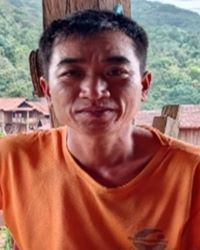The Akha Jipia (Chipia on other lists) people live in at least 20 mountain villages in the Oudomxay and Phongsaly provinces, typically living at elevations above 1200 meters. The Akha tribe make up the 9th largest ethnic group in Laos, and the Jipia people are a small subtribe of the Akha. The larger Akha tribe migrated from China, likely in the 16th or 17th centuries fleeing unrest, and also later in the 20th century.The language of the Akha is part of the Tibeto-Burman family, and they maintain an oral tradition without a written script. All Akha subgroups speak dialects of the Akha language. Dialects vary, but most understand the jeu g'oe dialect used in southern China, Thailand, and Myanmar. Though some of the tribes do interact some, they remain distinct. The gospel does not naturally flow from one group to the next.
The Akha are known for their semi-nomadic lifestyle, patriarchal society and vibrant cultural practices, including intricate embroidered clothing and apparel. Akha society sees men as headmen overseeing rituals and disputes, while women handle domestic tasks and crafting, with fewer rights. Akha women across subgroups wear elaborate headdresses (u-coe), adorned with silver coins, beads, and threads, signifying age, marital status, and subgroup identity. These can weigh several kilograms and are rarely removed. Men often wear modern clothing, though some retain traditional blue trousers and jackets.The Jipia, like some other regional subgroups, practice slash-and-burn agriculture, growing rice, corn and sometimes coffee. Historically, some cultivated opium, but crop replacement programs promote tea and fruit. Subgroups like the Jipia live in small, high-elevation villages (300–350 people) built from wood, bamboo, and thatch, featuring “spirit gates” with carvings to ward off evil spirits. Houses are gender-divided, reflecting spiritual beliefs.
The Jipia, like most Akha subgroups, practice animism, worshipping ancestors and nature spirits. Rituals like “yukham” (postpartum fire rituals) and “kalum” (temporary prohibitions) are common. They fear the spirit world and believe they can be helped or harmed by these spirits. Often, they get the help of shamans and other religious specialists for rituals to appease spirits. People with this worldview often open their hearts more quickly to the gospel since Christ offers protection from the spirits. Some have adopted Christianity, blending it with animism.
All Akha subgroups, including Jipia, are among the poorest hill tribes, with limited access to education, healthcare, or electricity. Opium addiction affects one in ten Akha, and HIV/AIDS rates are high, with women often bearing economic burdens.
Pray that the Man in white will visit them in dreams.Pray for the Holy Spirit to do miracles among the Akha Jipia people, showing them God's power and care.Pray for disciples who will make more disciples.Pray for their physical and spiritual needs to be met by our generous God.Pray that God will give wisdom, courage and joy to front-line workers in remote and difficult areas of Laos.Pray for Akha Christians to stand strong and have courage.
Scripture Prayers for the Akha Jipia in Laos.
https://en.wikipedia.org/wiki/Akha_peopleAkha.orgContemporarynomad.comWikipedia.orgGreen-trails.comFactsanddetails.comBestregardsfromfar.comAtlasofhumanity.comDietmartemps.comHeritage-line.comAllpointseast.comThecandytrail.comLaoslife.infopeoplesoftheworld.orgexplore-laos.comlaos-adventures.comthehikerlaos.comOckpoptok.comSimple.wikipedia.orgThejakartapost.comBritannica.com
| Profile Source: Joshua Project |










